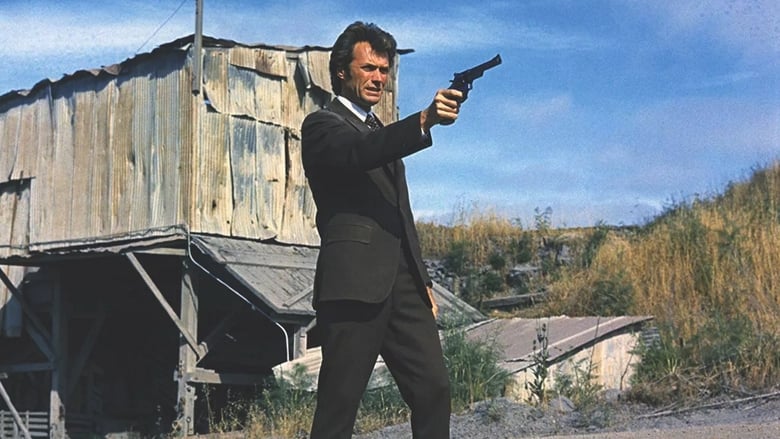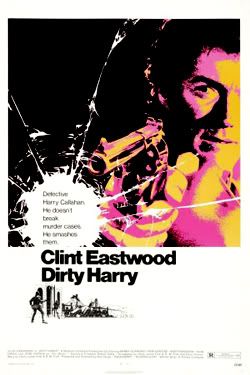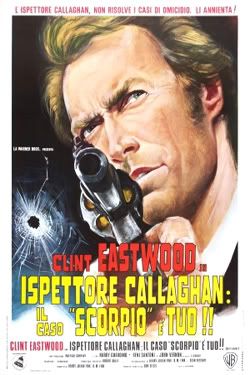← Back to Reviews

in
Plot – The city of San Francisco is being terrorised by a killer who stalks the city's rooftops, going by the name of Scorpio. Unless he receives $100,000 he promises to continue killing. Police detective Harry Callahan makes it his mission to hunt down and stop the psycho, using his unique brand of justice if required.
“I know what you're thinking. "Did he fire six shots or only five?" Well, to tell you the truth, in all this excitement I kind of lost track myself. But being as this is a .44 Magnum, the most powerful handgun in the world, and would blow your head clean off, you've got to ask yourself one question: "Do I feel lucky?" Well, do ya, punk?”
A cracking, iconic piece of dialogue. However would it have worked quite so well if Frank Sinatra (first choice for the role) had been the man delivering it? Somehow I don't think so. Every so often there is a performance that after you've seen it you just can't imagine anyone else could have played the role. This is one of those performances. Eastwood just oozes cool and a ruthless machismo as Harry Callahan. As this savage warrior, trying to find his place in modern society, he brings a terrific intensity.
This is a really taut, spartan offering from Don Siegel. It's a relatively simple story, told in an extremely straightforward manner which barely wastes a minute. We open with the killer's first strike against the city, and from then on the film is almost solely concerned with the ever escalating conflict between Scorpio and Dirty Harry. Outside of one line about his wife we don't really learn anything personal about Harry. We don't get to see his home life, we don't see what motivates and drives him, what it is that has crafted his current character. And to be honest it doesn't really feel like we have to see any of it. The character is just so unshakable and determined in his actions that we accept it without having to wonder why he is like this.
We only get a few breathers from the main story to see what kind of cop Harry is, and the actions he takes in the line of work. We see his unique involvement in a bank robbery and an attempted suicide. We see that he is pretty much a bad ass who doesn't care who he upsets as long as he gets the job done.
The film shares a lot of the same qualities of the other Siegel movie I've watched recently, Charley Varrick. As well as a charismatic central performance, the film is driven by Siegel's energy and style His style is not overly fussy or ostentatious; he just delivers captivating cinema with some dynamic action. Also like Charley Varrick the film is awash with colourful characters and some cracking, rich and vibrant dialogue. Eastwood is given most of these great lines to growl, and outside of the iconic “do you feel lucky?” other favourites of mine included his response to being asked of his involvement in the assault on Scorpio - “Anyone can tell I didn't do that to him...cause he looks too damn good!” and explaining some of previous actions - “When a naked man is chasing a woman through an alley with a butcher knife and a hard-on, I figure he isn't out collecting for the Red Cross.” The further work of Don Siegel is certainly something I plan on checking out.
As well as just delivering a great piece of blistering action the film also tackles the issue of justice, and if it can be served correctly when you give the criminals too many rights to the detriment of the rights of the victim. To try and stop the bad guys from further crime the cops may step over the line and do something that allows the criminal to walk free. Where the film was once considered controversial and indeed fascist, now it feels very standard, clichéd even. Any cop worth his salt these days, whether it be on the big screen or small, has to be a maverick who plays by his own rules. A man not frightened to play 'dirty' as long as achieves the right results.
This film stands out from much of the other 70s fare so far. Whereas most of the films you could describe as leftist and critical of authority/establishment, this is a rare deviation from that. In a landscape of anti-nuclear (The China Syndrome), anti-government (All the President's Men) and anti-establishment (Dog Day Afternoon) films this certainly seems to stand out as a bit of a wet dream for those of a right wing persuasion. Perhaps the fact that the film was produced and released before the events of Watergate and Attica, and before the end of the Vietnam war, means that while there may only be a few years difference from most of the other films I've viewed, it's a product of a very different time.
The film also makes it extremely easy to root for such an anti-hero, and cheer on his questionable acts, by pitting him against such a despicable and heinous villain. While actually based on the real-life Zodiac killer Scorpio feels a lot like the kind of comic book style serial killers found in the TV show Dexter, with his 'cool' name and over the top manner. A lot of credit should go to Andy Robinson for helping to create this vile monster. He is extremely hateful. As well as being vicious when he's hunting, when he becomes the prey he turns into a pathetic, snivelling creep; begging for his rights and to be left along. He's not a particularly well crafted or written villain. We don't learn anything about his background, or the reasons that have motivated and moulded him to this point. So it has to be his actions that power the character and there are a number of striking and disturbing scenes which do so. Perhaps the most powerful being when he pays a man to beat him to a bloody, swollen pulp. Though he actually has to be one of the worst serial killers ever committed to celluloid. While he does rack up a few kills he also comes close to being captured a number of times throughout the film, his escapes more to do with luck than any real skill.
There are a number of other elements in the film which added to my extreme enjoyment of it. There's the funky, psychedelic score from Lalo Schifrin and the moody, atmospheric use of shadows as the majority of the film takes place at night. Particularly impressive and indeed quite eerie are the scenes taking place in the football stadium as Harry chases down Scorpio. I also think it's a great 'city movie', on this occasion wonderfully showing off San Francisco. It feels like a real time capsule of the city from that time. Oh and while the role of Gonzalez isn't given a great deal of screen time, the relationship between him and Callahan is well handled as Gonzalez goes from a useless rookie in Harry's eyes to a cop who has earned his respect and gratitude.
I also really enjoyed the finale of the film. It really highlights the old-style values of Harry. Like a sheriff out of the Old West he guns down his target, before taking his badge and throwing it into the river, walking off into the sunet never to be seen again (except in the four subsequent sequels of course! ). Even the setting for this final showdown; an old mine, helps to evoke the environment and era were this character would seem more comfortable.
). Even the setting for this final showdown; an old mine, helps to evoke the environment and era were this character would seem more comfortable.
Conclusion – A thrilling, searing piece of action. A truly great cop movie, well deserving of its iconic status. A film that set the benchmark and template for so many action films to follow, particularly in the 80s with the arrival of Stallone, Schwarzenngger, Seagal etc

|

|
Year of release
1971
1971
Directed by
Don Siegel
Don Siegel
Written by
Harry Julian Fink
Rita M. Fink
Dean Riesner
Harry Julian Fink
Rita M. Fink
Dean Riesner
Starring
Clint Eastwood
Andrew Robinson
John Vernon
Reni Santoni
Clint Eastwood
Andrew Robinson
John Vernon
Reni Santoni
Dirty Harry
-
Plot – The city of San Francisco is being terrorised by a killer who stalks the city's rooftops, going by the name of Scorpio. Unless he receives $100,000 he promises to continue killing. Police detective Harry Callahan makes it his mission to hunt down and stop the psycho, using his unique brand of justice if required.
“I know what you're thinking. "Did he fire six shots or only five?" Well, to tell you the truth, in all this excitement I kind of lost track myself. But being as this is a .44 Magnum, the most powerful handgun in the world, and would blow your head clean off, you've got to ask yourself one question: "Do I feel lucky?" Well, do ya, punk?”
A cracking, iconic piece of dialogue. However would it have worked quite so well if Frank Sinatra (first choice for the role) had been the man delivering it? Somehow I don't think so. Every so often there is a performance that after you've seen it you just can't imagine anyone else could have played the role. This is one of those performances. Eastwood just oozes cool and a ruthless machismo as Harry Callahan. As this savage warrior, trying to find his place in modern society, he brings a terrific intensity.
This is a really taut, spartan offering from Don Siegel. It's a relatively simple story, told in an extremely straightforward manner which barely wastes a minute. We open with the killer's first strike against the city, and from then on the film is almost solely concerned with the ever escalating conflict between Scorpio and Dirty Harry. Outside of one line about his wife we don't really learn anything personal about Harry. We don't get to see his home life, we don't see what motivates and drives him, what it is that has crafted his current character. And to be honest it doesn't really feel like we have to see any of it. The character is just so unshakable and determined in his actions that we accept it without having to wonder why he is like this.
We only get a few breathers from the main story to see what kind of cop Harry is, and the actions he takes in the line of work. We see his unique involvement in a bank robbery and an attempted suicide. We see that he is pretty much a bad ass who doesn't care who he upsets as long as he gets the job done.
The film shares a lot of the same qualities of the other Siegel movie I've watched recently, Charley Varrick. As well as a charismatic central performance, the film is driven by Siegel's energy and style His style is not overly fussy or ostentatious; he just delivers captivating cinema with some dynamic action. Also like Charley Varrick the film is awash with colourful characters and some cracking, rich and vibrant dialogue. Eastwood is given most of these great lines to growl, and outside of the iconic “do you feel lucky?” other favourites of mine included his response to being asked of his involvement in the assault on Scorpio - “Anyone can tell I didn't do that to him...cause he looks too damn good!” and explaining some of previous actions - “When a naked man is chasing a woman through an alley with a butcher knife and a hard-on, I figure he isn't out collecting for the Red Cross.” The further work of Don Siegel is certainly something I plan on checking out.
As well as just delivering a great piece of blistering action the film also tackles the issue of justice, and if it can be served correctly when you give the criminals too many rights to the detriment of the rights of the victim. To try and stop the bad guys from further crime the cops may step over the line and do something that allows the criminal to walk free. Where the film was once considered controversial and indeed fascist, now it feels very standard, clichéd even. Any cop worth his salt these days, whether it be on the big screen or small, has to be a maverick who plays by his own rules. A man not frightened to play 'dirty' as long as achieves the right results.
This film stands out from much of the other 70s fare so far. Whereas most of the films you could describe as leftist and critical of authority/establishment, this is a rare deviation from that. In a landscape of anti-nuclear (The China Syndrome), anti-government (All the President's Men) and anti-establishment (Dog Day Afternoon) films this certainly seems to stand out as a bit of a wet dream for those of a right wing persuasion. Perhaps the fact that the film was produced and released before the events of Watergate and Attica, and before the end of the Vietnam war, means that while there may only be a few years difference from most of the other films I've viewed, it's a product of a very different time.
The film also makes it extremely easy to root for such an anti-hero, and cheer on his questionable acts, by pitting him against such a despicable and heinous villain. While actually based on the real-life Zodiac killer Scorpio feels a lot like the kind of comic book style serial killers found in the TV show Dexter, with his 'cool' name and over the top manner. A lot of credit should go to Andy Robinson for helping to create this vile monster. He is extremely hateful. As well as being vicious when he's hunting, when he becomes the prey he turns into a pathetic, snivelling creep; begging for his rights and to be left along. He's not a particularly well crafted or written villain. We don't learn anything about his background, or the reasons that have motivated and moulded him to this point. So it has to be his actions that power the character and there are a number of striking and disturbing scenes which do so. Perhaps the most powerful being when he pays a man to beat him to a bloody, swollen pulp. Though he actually has to be one of the worst serial killers ever committed to celluloid. While he does rack up a few kills he also comes close to being captured a number of times throughout the film, his escapes more to do with luck than any real skill.
There are a number of other elements in the film which added to my extreme enjoyment of it. There's the funky, psychedelic score from Lalo Schifrin and the moody, atmospheric use of shadows as the majority of the film takes place at night. Particularly impressive and indeed quite eerie are the scenes taking place in the football stadium as Harry chases down Scorpio. I also think it's a great 'city movie', on this occasion wonderfully showing off San Francisco. It feels like a real time capsule of the city from that time. Oh and while the role of Gonzalez isn't given a great deal of screen time, the relationship between him and Callahan is well handled as Gonzalez goes from a useless rookie in Harry's eyes to a cop who has earned his respect and gratitude.
I also really enjoyed the finale of the film. It really highlights the old-style values of Harry. Like a sheriff out of the Old West he guns down his target, before taking his badge and throwing it into the river, walking off into the sunet never to be seen again (except in the four subsequent sequels of course!
 ). Even the setting for this final showdown; an old mine, helps to evoke the environment and era were this character would seem more comfortable.
). Even the setting for this final showdown; an old mine, helps to evoke the environment and era were this character would seem more comfortable. Conclusion – A thrilling, searing piece of action. A truly great cop movie, well deserving of its iconic status. A film that set the benchmark and template for so many action films to follow, particularly in the 80s with the arrival of Stallone, Schwarzenngger, Seagal etc
